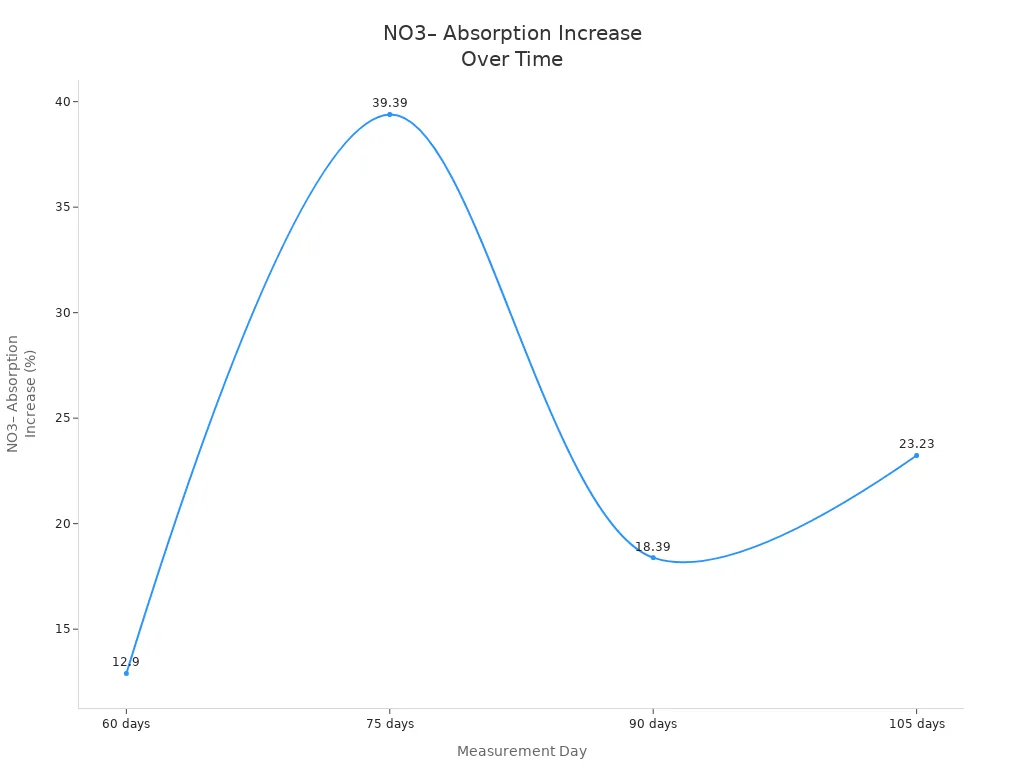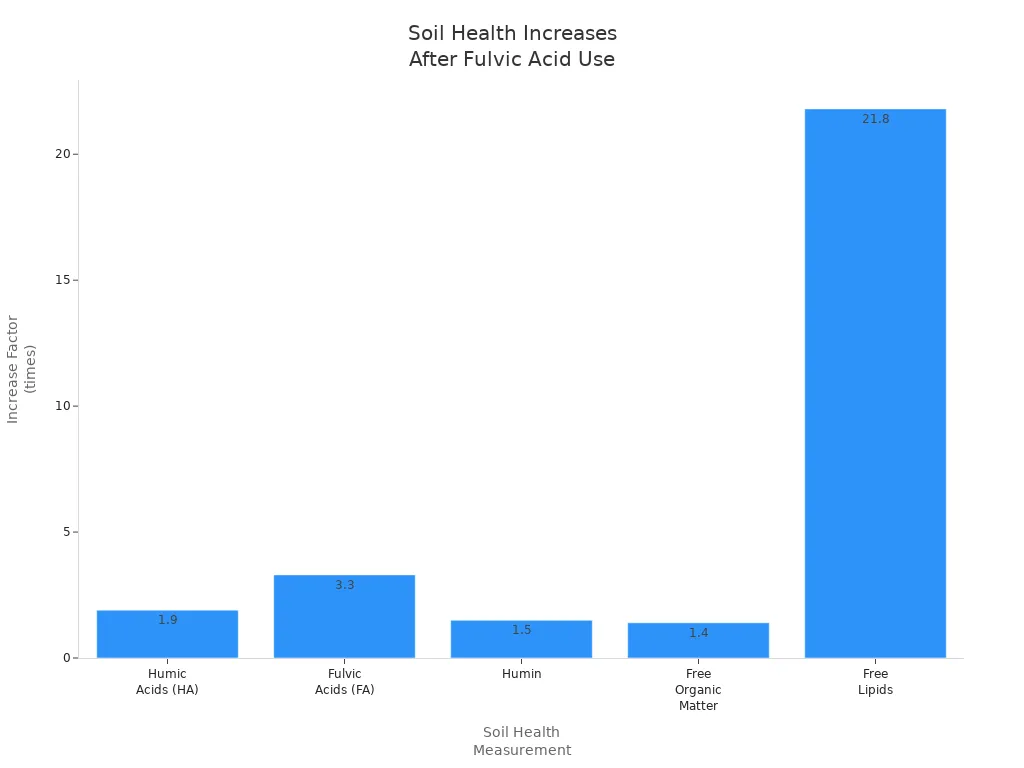Fulvic acid applications in Spain

You can see fulvic acid helping in many places in Spain. Farmers use it to help crops grow better and get more food. More farms are starting to use organic ways, which makes the market grow. The farming business made USD 0.5 billion in 2022 and might make twice as much by 2030. Spanish farmers and people who take care of land want healthier soil and better ways to farm. Have you thought about how fulvic acid helps Spain find new and greener ideas?
Key Takeaways
Fulvic acid helps crops grow better and makes soil healthier. This means farmers get more crops and stronger plants. - Farmers can use fulvic acid in different ways. They can spray it on leaves or mix it into the soil. This helps plants take in more nutrients. - Adding fulvic acid to animal feed makes animals healthier. This gives better meat, milk, and eggs. - Farmers should learn about local rules for using fulvic acid. This helps them follow the law and get the most benefits. - The fulvic acid market in Spain will likely get bigger. This gives farmers more chances to use eco-friendly methods.
Fulvic Acid in Agriculture
Application Methods
Spanish farmers use fulvic acid in different ways. They spray it on leaves or mix it into the soil. Some add it with drip irrigation. Others treat seeds before planting. Each way helps plants get more nutrients. Spraying on leaves lets them take in fulvic acid fast. Putting it in soil helps roots grow well. Drip irrigation brings fulvic acid to roots with water. Treating seeds helps young plants start healthy.
Tip: You can try many ways to use fulvic acid. See which one works best for your crops and soil.
The table below shows how much more nitrate plants take in with fulvic acid over time:
Measurement Day | NO3– Absorption Increase (%) |
|---|---|
60 days | 12.90% |
75 days | 39.39% |
90 days | 18.39% |
105 days | 23.23% |

Benefits
Fulvic acid gives many good things to farms. It helps soil keep more nutrients and keeps pH steady. Crops like wheat, tomatoes, and olives grow faster and stronger. Fulvic acid makes soil better and helps plants use minerals. You may get bigger harvests and healthier crops.
Here is a table that shows how soil gets better after using fulvic acid:
Measurement | Increase Factor | Description |
|---|---|---|
Humic Acids (HA) | 1.9 times | More humic acid in the soil |
Fulvic Acids (FA) | 3.3 times | More fulvic acid in the soil |
Humin | 1.5 times | More humin in the soil |
Free Organic Matter | 1.4 times | More free organic matter |
Free Lipids | 21.8 times | More free lipids in the soil |
Biological Activity | Enhanced | Soil life is more active |
SOC Mineralization | Progressive | Soil organic carbon breaks down more |
Humification | Concomitant | More humic acids build up |

Case Studies
There are real stories about fulvic acid on Spanish farms. In Castilla-La Mancha, wheat farmers got more crops after using fulvic acid. Olive growers in Andalucía saw stronger trees and better fruit. Tomato farmers in Murcia used drip irrigation with fulvic acid. They got healthier plants and more tomatoes per field.
Wheat farms in Castilla-La Mancha: More crops and better soil.
Olive groves in Andalucía: Stronger trees and better fruit.
Tomato fields in Murcia: More tomatoes and healthier plants.
Spanish farmers keep trying fulvic acid on new crops. You can look at their results and see if fulvic acid can help your farm too.
Environmental Applications
Soil Remediation
You can use fulvic acid to help clean up polluted soils in Spain. Many environmental projects focus on areas with heavy metals or salt buildup. Wild olive trees often grow in these places. When you add fulvic acid, it helps plants take up fewer harmful substances. This makes the soil safer for crops and animals. You might see this method in places where old factories or farms left behind pollution.
Note: Wild olive trees in Spain show strong results when you use fulvic acid for phytoremediation. These trees grow better and help remove toxins from the soil.
Land Restoration
Restoring land means making damaged soil healthy again. In southern Spain, researchers studied how beet vinasse and compost can improve soil. They found that fulvic acids play a big part in this process. When you mix beet vinasse with cotton gin compost, the soil gets better in many ways:
Soil pH becomes more stable.
Soil structure improves, so roots can grow deeper.
Soil life becomes more active, which helps plants.
You can use these methods to bring life back to old farmland or areas hurt by erosion. Healthy soil supports more plants and keeps the land strong for the future.
Animal Husbandry
Livestock Feed
You can help animals get stronger by adding special supplements to their food. Many farmers in Spain use humic and fulvic acid supplements for their animals. These natural things help animals get more from what they eat. When you put them in feed, cows, sheep, and pigs have better gut health. Farmers pick these supplements to have healthier animals and better products. More farms want to use organic and earth-friendly ways. This change helps give people more organic meat, milk, and eggs.
Humic and fulvic acid supplements help animals get more nutrients.
Animals have better gut health.
Farmers get more from their herds.
More farms use these for organic and earth-friendly farming.
Tip: Try putting these supplements in your animals’ food. You might see your animals get stronger and healthier.
Reported Outcomes
When you use these supplements, you can see many good results. Studies in Spain show animals eat better and use food well. You may see fewer animals getting sick or dying. Farmers also say milk, meat, and eggs are better. These changes help you get more from your farm.
Benefit | Description |
|---|---|
Feed Efficiency | Animals use food better and waste less. |
Lower Mortality Rates | Fewer animals get sick or die. |
Product Quality | Meat, milk, and eggs improve in quality. |
You can see fulvic acid is important in animal husbandry today. Spanish farms that use these supplements often lead in earth-friendly farming.
Regulatory Landscape
Regulations
You should learn the rules before using fulvic acid. Spain does not have special laws for fulvic acid or biofertilizers. The rules can be confusing and hard to understand. This makes it tricky to know what is allowed. You must follow general laws for fertilizers and soil products. These laws help keep food safe and protect nature.
Other European countries have clearer rules for biofertilizers. They have special laws that explain how to use and sell them. In Spain, you may need to ask local offices for the right information. The rules can be different in each area, which can be confusing.
Note: Always ask your local agriculture office before using fulvic acid. They will help you follow the newest rules.
Certification
If you want to sell fulvic acid in Spain, you need certificates. Getting these certificates can be tough. Spain does not have one way to test and approve fulvic acid. You may need to prove your product is safe and works well. If you want to sell to organic farms, you must meet extra rules.
Here is a table that shows the main problems you may face in Spain and other European countries:
Challenge | Spain | Other European Countries |
|---|---|---|
Specific Legislation | No special laws for biofertilizers | Clearer rules for biofertilizers |
Regulatory Complexities | Yes | Yes |
Standardization | Not enough | More set standards |
Farmer Awareness | Many farmers do not know much | More farmers know about it |
You can see Spain has less clear rules and testing. Many farmers do not know much about fulvic acid. In other countries, it is easier to get approval and more farmers know about these products.
Tip: If you want to get your fulvic acid certified, talk to experts. They know the Spanish system and can help you avoid mistakes.
Challenges and Opportunities
Adoption Barriers
You may face some challenges when you try to use fulvic acid on your farm or in your business. Many farmers in Spain do not know much about fulvic acid. Some people worry about the cost of new products. Others feel unsure because the rules are not clear. You might find it hard to get the right information or training.
Lack of awareness: Many farmers have not heard about fulvic acid or its benefits.
Unclear regulations: You may feel confused by the rules for using and selling fulvic acid.
Cost concerns: Some farmers think fulvic acid costs too much at first.
Limited access: You might not find fulvic acid products in every region.
Note: You can talk to local experts or join farm groups to learn more. Sharing your experience helps others understand fulvic acid better.
Future Trends
You will see more farms and companies in Spain using fulvic acid in the next few years. Experts say the market for fulvic acid will keep growing. More people want healthy soil and better crops. You may notice new products and better ways to use fulvic acid.
Here is a table that shows how sales of fulvic acid are expected to grow in Spain:
Year | Sales Revenue (Million $) | CAGR (%) |
|---|---|---|
2021 | 3.841 | - |
2025 | 4.87 | 5 |
2033 | 7.196 | - |
You can see steady growth in sales. This means more farmers and companies trust fulvic acid. You may also see new research and better technology. These changes can make fulvic acid easier to use and more effective.
More organic farms will use fulvic acid.
New studies will show how fulvic acid helps different crops and animals.
Companies will create new products for easier use.
Tip: Stay updated with the latest news and research. You can take advantage of new trends and help your farm or business grow.
You can see fulvic acid making a difference in Spain. It helps crops grow, improves soil, and supports healthy animals.
Fulvic acid changes soil features, boosts nutrients, and helps plants grow strong.
It works with roots and leaves, causing big changes in plant growth.
Results depend on your farming methods and local conditions.
You face unclear rules, but new research brings hope. Scientists want better ways to study fulvic acid and measure its effects. You can help shape the future by learning more and trying new ideas. Fulvic acid could lead Spain toward greener farming.
FAQ
What crops can you use fulvic acid on in Spain?
You can use fulvic acid on wheat, tomatoes, olives, and many other crops. Spanish farmers also try it on grapes, peppers, and citrus fruits. Fulvic acid helps most plants grow stronger and healthier.
Is fulvic acid safe for animals?
Yes, you can add fulvic acid to animal feed. Studies in Spain show that cows, sheep, and pigs eat better and stay healthier. Farmers report better milk, meat, and eggs from animals that get fulvic acid supplements.
How do you apply fulvic acid to soil?
You can mix fulvic acid into the soil, spray it on leaves, or use drip irrigation. Some farmers treat seeds before planting. Each method helps plants absorb nutrients and grow better.
Do you need special permission to use fulvic acid in Spain?
You do not need special permission, but you must follow general fertilizer rules. Always check with your local agriculture office. Rules can change in different regions, so stay updated.
See Also
Understanding Fulvic Acid: Its Uses and Benefits
Exploring Humic Acid Benefits and Applications in Australia
The Role of Humic Acid Fertilizers in the Philippines
